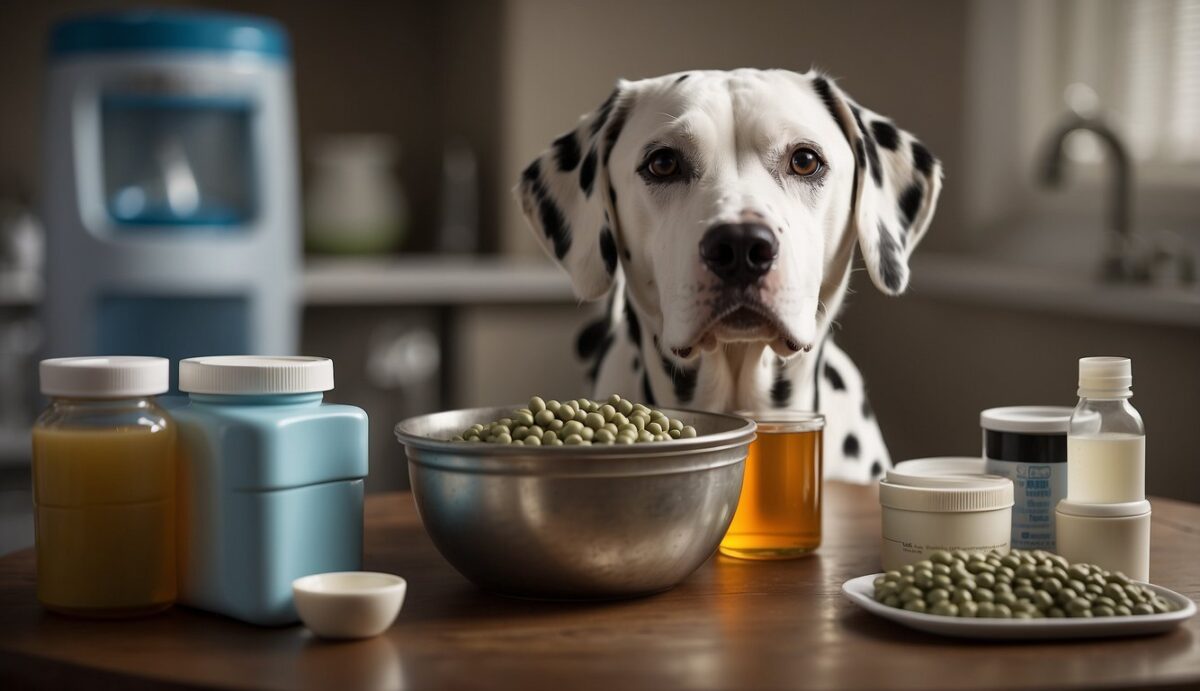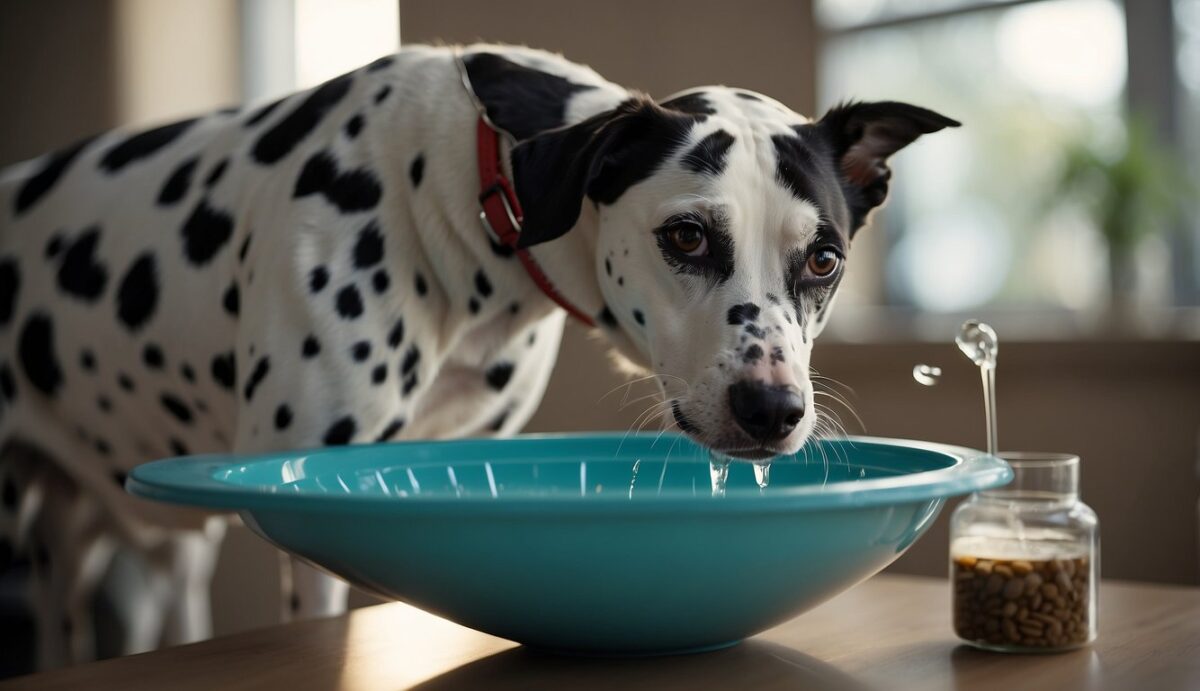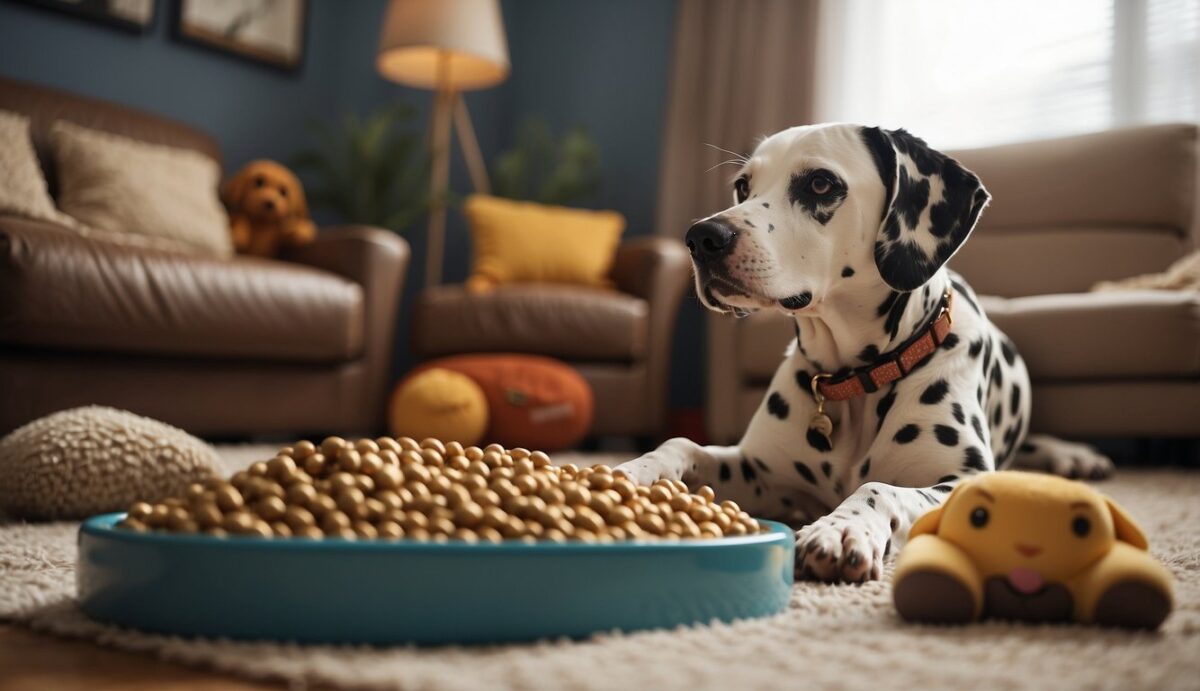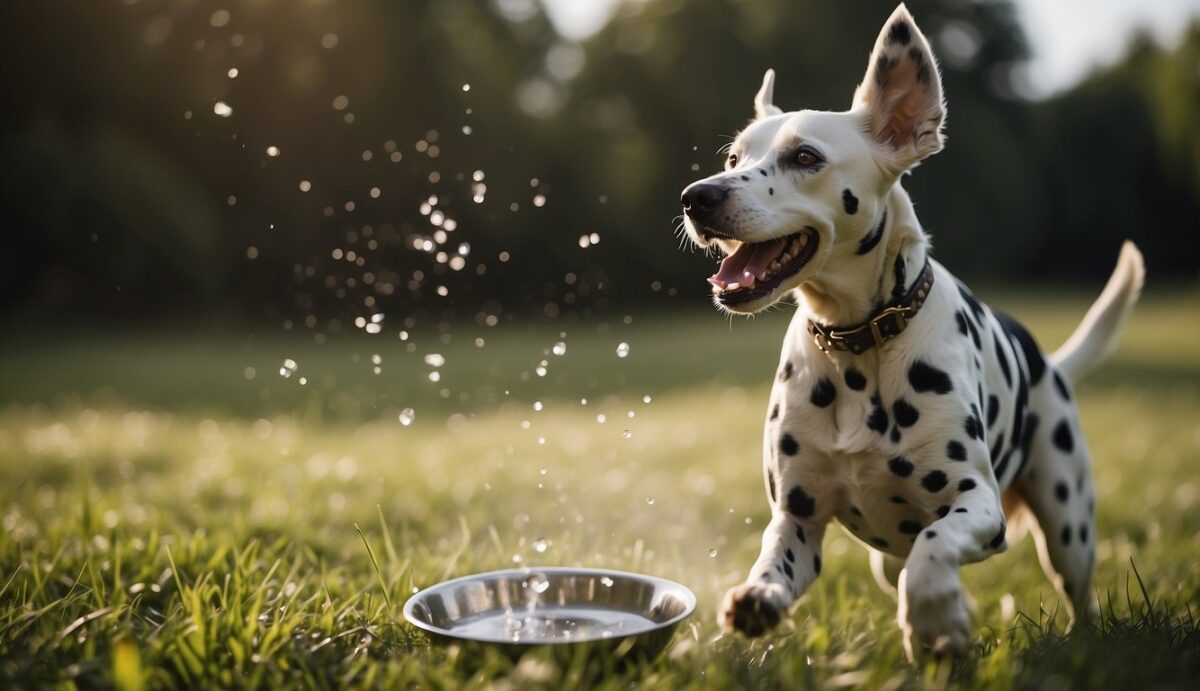Dalmatian urinary tract health is a topic of great importance for owners of this distinctive breed known for its unique spotted coat.
These dogs can face specific challenges due to a genetic predisposition that affects the way they metabolize certain waste products, which can result in the formation of urinary stones.
Understanding the nature of these health issues is crucial for any Dalmatian owner, as early detection and proper management can significantly improve a dog’s well-being and quality of life.
Addressing urinary tract infections (UTIs) in Dalmatians requires a proactive approach, as these can lead to the formation of struvite stones, especially when caused by urease-producing bacteria.
Preventive strategies, such as maintaining adequate hydration, providing a suitable diet, and regular veterinary check-ups, play essential roles in safeguarding against urinary complications.
For those instances when treatment is necessary, a range of options from dietary adjustments to surgery are available, depending on the severity and type of the condition.
Key Takeaways
- Early detection and proper management of urinary issues are vital for Dalmatian health.
- Preventive measures include adequate hydration and regular vet visits.
- Treatment options vary and can include diet changes and surgical intervention.
Understanding Dalmatian Urinary Tract Health

As a Dalmatian owner, it’s important for you to know that your furry friend has a specific set of urinary tract health needs due to their unique internal make-up.
Being informed about their physiology, recognizing signs of health issues, and ensuring regular vet check-ups could save your Dalmatian from discomfort or life-threatening conditions.
Unique Physiology of Dalmatians
Your Dalmatian’s metabolism has a distinct characteristic not shared with most other dog breeds.
Their bodies convert purines, which are found in many types of food, to urate. Normally, a dog’s liver converts this urate to allantoin, which is more easily excreted.
However, Dalmatians often carry a recessive gene (the SLC2A9 gene) that impairs their ability to process uric acid because of their genetic predisposition.
This may lead to the buildup of urate crystals in their urinary system, which can culminate in urinary stones.
Recognizing the Signs of Urinary Tract Issues
Awareness of the symptoms your Dalmatian may exhibit if they have urinary tract health problems is essential. Watch for the following indicators:
- Pain or discomfort: Your Dalmatian might whine or be reluctant to urinate due to pain.
- Difficulty urinating: They may strain or take longer to urinate, or produce only a small amount despite the effort.
- Visible blood in urine: This can sometimes be the result of stones causing irritation or damage in the urinary tract.
Importance of Regular Veterinary Check-Ups
Make sure your Dalmatian sees their veterinarian regularly. Early detection of urinary tract issues is vital, and this typically involves:
- Routine urinalysis exams: to monitor for urate crystals before they form stones.
- Discussing dietary adjustments: to reduce the consumption of foods high in purines, which contribute to uric acid formation.
- Regular monitoring: of your Dalmatian’s urinary habits, ensuring you’re equipped with the knowledge to seek help at the first sign of trouble.
Preventive Strategies

Maintaining the health of your Dalmatian’s urinary tract is essential. The following strategies will minimize their risk of infections and the development of urinary stones, focusing mainly on diet, hydration, and exercise.
Optimizing Diet for Urinary Health
A well-balanced diet tailored for your Dalmatian helps reduce the risk of stone formation.
Limiting purine-yielding foods is crucial, as Dalmatians have a unique metabolism that often cannot process purine efficiently, leading to urate stones. Foods that are high in purines such as organ meats and some fish should be avoided.
Incorporating fruits and vegetables into your dog’s diet can help. They not only provide essential vitamins and minerals but also promote alkaline urine that can help dissolve certain types of stones. Stick to low-purine vegetables like green beans, carrots, and zucchini.
Benefits of Hydration and Water Intake
Hydration plays a pivotal role in preventing urinary stones. Encourage your Dalmatian to drink plenty of water to dilute the urine, reducing the concentration of stone-forming minerals.
- Water bowls: Place multiple water bowls around your home to prompt your Dalmatian to drink regularly.
- Wet food: Incorporate wet food into their diet; it has a higher moisture content than dry kibble.
Remember, a high water intake flushes out minerals and crystals from the urinary tract before they can form into stones.
Importance of Regular Exercise and Weight Management
Regular exercise ensures your Dalmatian stays physically fit and helps keep the urinary system healthy. Overweight dogs are at a higher risk of developing urinary stones.
- Daily walks and playtime: These are not just good for your dog’s general health but also encourage frequent urination, which helps clear the urinary tract.
- Healthy weight: Maintain a weight that’s ideal for your Dalmatian’s size and breed to minimize stress on their organs.
Common Urinary Tract Issues in Dalmatians

Dalmatians are uniquely prone to certain urinary tract issues, including urinary stones, urinary tract infections, and kidney disease. Understanding how to identify these problems and their symptoms can help you keep your Dalmatian healthy.
Identifying Urinary Stones and Crystals
Urinary stones, particularly urate stones, are common in Dalmatians due to a genetic trait that affects uric acid metabolism.
You might notice your Dalmatian straining to urinate or producing urine that is dark in color or contains blood. Stones can sometimes block the urethra, leading to a dangerous build-up of urine.
- Signs of Urinary Stones:
- Straining during urination;
- Blood in the urine; and
- Frequent attempts to urinate with little success.
Staying vigilant for these signs can facilitate early detection and treatment, which might include dietary changes or even surgery if the stones cause a blockage.
Urinary Tract Infections (UTIs)
Urinary tract infections are not uncommon in Dalmatians. They can be caused by bacteria entering the urinary tract and may present as discomfort during urination or a change in the frequency or smell of urine.
If you suspect your Dalmatian has a UTI, it is important to seek veterinary care to obtain appropriate antibiotics and prevent the infection from spreading to the kidneys.
- Symptoms of UTIs:
- Discomfort or pain during urination;
- Increased frequency or urgency of urination; and
- Foul-smelling or cloudy urine.
Spotting Early Signs of Kidney Disease
Kidney disease can be a consequence of long-term urinary issues such as recurrent stones or infections.
Early signs of kidney problems can include changes in water consumption and urine concentration. Watch for either increased drinking or urination, which can indicate the kidneys are not filtering waste properly.
- Indicators of Kidney Trouble:
- Excessive drinking or urination;
- Weight loss; and
- Lethargy or diminishment in overall energy levels.
Treatment Approaches

When managing your Dalmatian’s urinary tract health, understanding the treatment options is crucial. Medical interventions vary from dietary changes to surgery based on the severity and type of urinary condition.
Medical Management of Urinary Conditions
In cases of cystitis (bladder inflammation), typically caused by infection, antibiotics are prescribed.
For urolithiasis, which refers to stones or calcium deposits in the urinary system, treatment depends on the stone type.
Allopurinol may be used to manage urate stones, as it helps reduce the production of uric acid. However, it’s important to monitor for the formation of xanthine stones, which can occur as a result of allopurinol treatment.
In emergency situations where there is a complete urinary blockage, prompt emergency treatment is crucial to prevent kidney damage.
Dietary Adjustments and Prescriptions
Adjusting your dog’s diet is a foundational step in both treatment and prevention of urinary conditions.
Nutritionists often recommend a prescription diet that controls the levels of protein, sodium, and minerals like magnesium and calcium.
- Acidic urine can prevent the formation of struvite stones; hence, diets formulated to acidify the urine can be beneficial.
- Conversely, to prevent urate stones, a diet that promotes more alkaline urine might be suggested.
Supplementing with water-soluble fibers can also aid in reducing urinary stone risk.
When Surgery Is Necessary
Surgery may become the required course of action if dietary and medical management do not resolve the urinary blockage or if the stones are too large to pass naturally. The main objectives are to:
- Remove the stones.
- Alleviate the blockage to allow normal urinary flow.
- Prevent potential emergency scenarios.
Living with a Dalmatian: Lifestyle and Care

Caring for your Dalmatian means understanding their specific health needs and incorporating routines that support their well-being.
Creating a Supportive Environment
Your Dalmatian’s health thrives in an environment that caters to their energetic nature.
Daily routines should include regular exercise to maintain their fitness and manage their high energy levels.
This breed loves activities like running, playing fetch, and even AKC tracking events which are great outlets for their energy.
On top of exercise, make sure your Dalmatian has constant access to fresh water.
Proper hydration is crucial, as it can help prevent urinary tract issues, which Dalmatians are prone to.
Create a space for your pet where they can feel comfortable, safe, and have a designated area to relax after a day full of activities.
Community and Resources
Joining a community, such as the Dalmatian Club of America (DCA), can provide you and your Dalmatian with an extensive network of support.
Members often share valuable experiences and health tips specific to the breed.
Additionally, clubs often organize events, which can be excellent occasions for socializing your Dalmatian.
Look for local volunteer opportunities or study groups focused on urinary stones; these can be informative about the health issues Dalmatians face.
The DCA, recognized by the American Kennel Club (AKC), offers resources such as membership benefits, access to breed-specific health studies, and connections to other owners who can share firsthand advice on your Dalmatian’s well-being.
Research and Advances in Understanding

Scientific studies have made significant strides in shedding light on the genetic and dietary factors influencing urinary tract health in Dalmatians.
Keep in mind these advances not only improve the well-being of your spotted friends but also inform the broader field of genetics and metabolism applicable to other species, including humans.
Genetic Research and the SLC2A9 Gene
Recent research has pinpointed the SLC2A9 gene as a key player in Dalmatian urinary health.
Scientists found that a mutation in this gene causes elevated levels of uric acid, a byproduct of purine metabolism, which can lead to the formation of uroliths, commonly known as stones.
Such stones are aggregates of crystalline materials that can cause blockages in the urinary tract.
Understanding DNA on this level allows breeders to make informed decisions to reduce the genetic predisposition to stone formation in Dalmatians.
- Mutated gene identified: SLC2A9
- Result of mutation: High uric acid levels leading to urolith formation
Innovations in Dietary Management
Adjustments in your Dalmatian’s diet can dramatically influence the development of urinary stones.
With ongoing research, veterinarians now recommend diets low in purines, substances found in certain proteins that break down into urates.
Nutritional advances have brought about specialized diets that help manage urate levels in your dog’s body, preventing the aggregation of uroliths and promoting urinary tract health.
- Dietary focus:
- Low-purine proteins: Minimize high-purine intake
- Water consumption: Encourage increased drinking to dilute urine
Owner Education and Responsibilities

As a Dalmatian owner, your awareness of urinary tract health is crucial.
Frequent check-ups with a veterinarian are essential for early detection and treatment of potential issues like infections or urate stones.
Responsible pet care includes understanding how diet influences urinary health; specifically, the metabolism of purines found in certain foods.
Purine-rich foods to limit in your Dalmatian’s diet:
- Organ meats;
- Shellfish;
- Spinach;
- Mushrooms; and
- Potatoes.
Low-purine alternatives to consider:
- Whole grains;
- Eggs;
- Most vegetables (excluding those listed above); and
- Fruits.
Your Dalmatian’s body can convert purines into urates, and a recessive gene mutation makes them more prone to developing urate stones.
Strive for a balanced diet with moderate protein levels to manage this risk.
Here’s a simple checklist to help you:
- Schedule regular vet appointments;
- Monitor for signs of discomfort during urination;
- Maintain a balanced, low-purine diet for your dog;
- Keep fresh water available at all times to aid in flushing out urates; and
- Get involved with the Dalmatian Club of America for more resources.
Frequently Asked Questions (FAQs)

In this section, you’ll find answers to common queries about Dalmatian urinary tract health, focusing on preventing and treating infections and stones.
How can urinary stones be treated in Dalmatians?
If your Dalmatian has a urinary blockage due to stones, surgery might be necessary.
Immediate veterinary care is crucial for blocked urethras, as it prevents urine from backing up which can be life-threatening.
What are the typical symptoms of urinary stones in Dalmatians?
You might notice your Dalmatian straining to urinate, passing only small amounts of urine, or showing signs of pain during urination.
Blood in the urine is also a common symptom.
What dietary changes can help prevent ammonium urate stones in dogs?
To help prevent these stones, ensure your dog’s diet includes moderate amounts of high-quality protein and low purine content.
Increasing water intake is also important to dilute the urine.
What causes Dalmatians to be prone to developing kidney stones?
Dalmatians are unique among dogs as they have a genetic trait that causes high levels of uric acid in the urine. This can lead to the development of urate stones in their urinary tract.
How can the recurrence of urinary stones in dogs be prevented effectively?
Encourage frequent urination to prevent stagnant urine where crystals can form.
Follow veterinarian-recommended dietary plans and ensure your dog always has access to clean, fresh water.
What kind of food is recommended to aid in the prevention of bladder stones in dogs?
Choose dog food formulated for urinary health. This type of food typically has increased moisture, controlled protein levels, and specific nutrients to reduce stone formation.
Your vet can provide specific recommendations for your dog’s needs.

